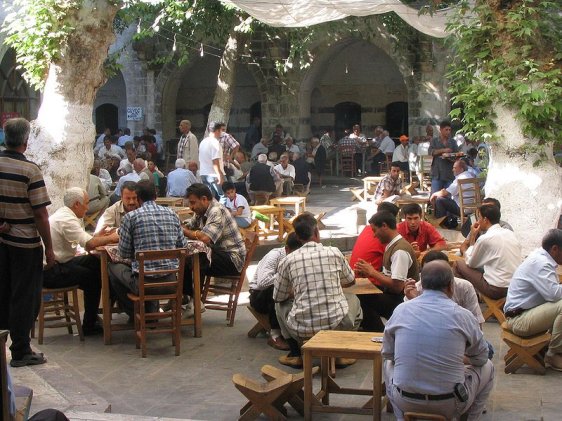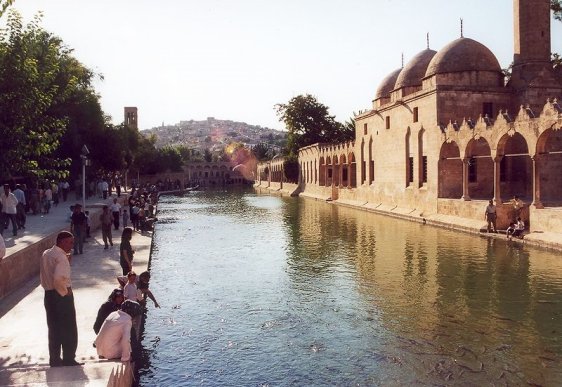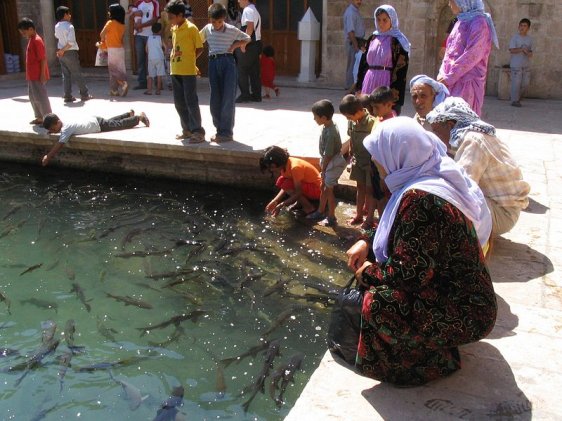Şanlıurfa (Syriac: ܐܘܪܗܝ, Kurdish: رها, Armenian: Ուռհա, Arabic: الرها) is an ancient city in southeastern Turkey. Commonly known also as Urfa, it is an ancient city with a history going back 5,500 years. The modern city today is the provincial capial of Şanlıurfa Province. It has a population of 500,000 people (2011 estimate).
Şanlıurfa is located on a plain about 80 km to the east of the Euphrates River. The city experiences a semi-arid climate with very hot summers and cool, wet winters. The hottest month is July, when the average high temperature may touch 38.8°C (101.8°F). Coldest month is January, when the average low temperature drops to 2.3°C (36.1°F). Summer tends to be the driest part of the year. January receives the most precipitation, at 73 mm (2.874 in).
 Şanlıurfa bazaar area, Turkey
Şanlıurfa bazaar area, TurkeySource: https://commons.wikimedia.org/wiki/File:UrfaBasar.jpg
Author: Kpisimon
Author: Kpisimon

Şanlıurfa is such an ancient city that it has absorbed the influences of many cultures passing its way. The modern city is a fascinating contrast justaposing the old against the new. Şanlıurfa has charming bazaars and alleys with medieval houses.
The first recorded history of Şanlıurfa was in the 4th century BC, although human habitation goes back as far as 9,000 BC. Şanlıurfa is one of the early settlements that form the Mesopotamian civilization. According to Turkish Muslim traditions, Şanlıurfa is the biblical city of Ur. It has been known as Urfa since the Byzantine period.
Islam arrived in Şanlıurfa in AD 638 when Rashidun conquered the area, and has established itself in the city ever since. There was however a Christian minority within the city for most of its history. Şanlıurfa became a trading hub for commodities such as cotton, leather and jewelry during the Ottoman period.
 The pool with holy carps in Balıklıgöl, Şanlıurfa
The pool with holy carps in Balıklıgöl, ŞanlıurfaSource: https://commons.wikimedia.org/wiki/File:Pool_Urfa_Turkey.jpg
Author: Christian Koehn
Author: Christian Koehn

Following the collapse of the Ottoman Empire during the First World War, Şanlıurfa was occupied by the British and subsequently the French, whose presence in the city was met with resistance and bloodshed. Even the peaceful withdrawal of the French was disrupted by an ambush that claimed 296 lives.
The city of Şanlıurfa continues to be a regional agricultural center with cotton among the chief commodities. The city has a number of historical sights but has so far not fully developed its tourism industry.
One of the delights of domestic tourists to Şanlıurfa are its local specialties and cuisine. Among these include çiğ köfte (raw meatballs) and lahmacun (pan bread topped with spicy meat).
Visiting Şanlıurfa
Şanlıurfa Airport (SFQ) is a new airport that receives regular flights from Istanbul and Ankara. There is a bus service from the airport to the city, timed according to flight arrivals. Playing with the carps in Balıklıgöl, Şanlıurfa
Playing with the carps in Balıklıgöl, ŞanlıurfaSource: https://commons.wikimedia.org/wiki/File:Baliklig%C3%B6lKinder.jpg
Author: Klaus-Peter Simon
Author: Klaus-Peter Simon

Sights & Attractions in Şanlıurfa
- Balıklıgöl: Muslim holy site associated with the Muslim tradition on the Prophet Abraham. It has a pond with carps with are regarded as holy fish.
- Caves of Abraham: Şanlıurfa (or rather, ancient Ur) is the place of origin for Abraham, and so there are many sites in the city that has become Islamic pilgrimage site associated with the prophet. The Caves of Abraham, according to tradition, is his birthplace. There are a number of mosques in its vicinity.
- Gölbaşı: Lakeside area at the foot of the citadel.
- Kapalı Çarşı: Covered stone bazaar where each street is devoted to a particular trade.
 Latest updates on Penang Travel Tips
Latest updates on Penang Travel Tips
 Map of Roads in Penang
Map of Roads in Penang
Looking for information on Penang? Use this Map of Roads in Penang to zoom in on information about Penang, brought to you road by road.
Copyright © 2003-2025 Timothy Tye. All Rights Reserved.

 Go Back
Go Back